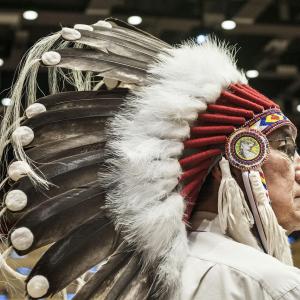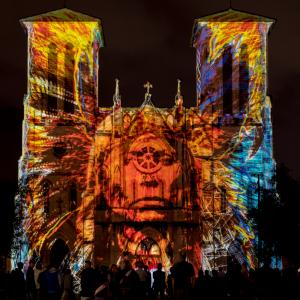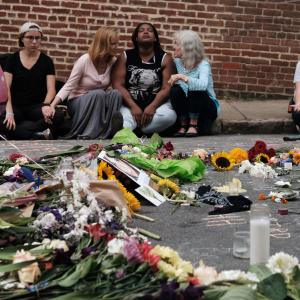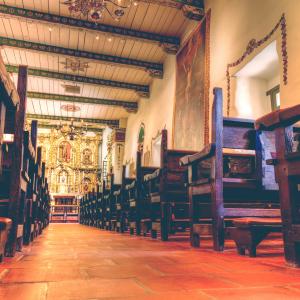
Kaitlin Curtice is a Native American Christian author and speaker. As an enrolled member of the Potawatomi Citizen Band and someone who has grown up in the Christian faith, Kaitlin writes on the intersection of Indigenous spirituality, faith in everyday life, and the church.
Her new book NATIVE (available May 2020) is about identity, soul-searching, and being on the never-ending journey of finding ourselves and finding God. As both a citizen of the Potawatomi Nation and a Christian, Kaitlin Curtice offers a unique perspective on these topics. In this book, she shows how reconnecting with her identity both informs and challenges her faith. Her first book, Glory Happening: Finding the Divine in Everyday Places, was published with Paraclete Press in 2017. It is a series of fifty essays and prayers focusing on finding the sacred in everyday life.
Kaitlin has contributed to OnBeing, Religion News Service, USA Today and Sojourners, among others, and she was interviewed for the New Yorker on colonization within Christian missions. In 2018 she was featured in a documentary with CBS called “Race, Religion and Resistance,” speaking on the dangers of colonized Christianity.
Kaitlin travels around the country speaking on faith and justice within the church as it relates to Indigenous peoples. She has been a featured speaker at Why Christian, Evolving Faith, Wild Goose Festival, The Festival of Faith and Writing, and more.
She also occasionally writes at her blog, kaitlincurtice.com.
Posts By This Author
When Will We Truly Celebrate Indigenous Peoples?

Image via United Nations Photo/Flickr.
So we need to at least have the conversation, and for children who are home from school for the “holiday,” we should encourage families to talk honestly about what the history of Native peoples has looked like in the United States. We should be talking about what our history books are missing.
Tending to Our Spirits in Times of Tragedy
When we return to each other, to the vitriol of the world and the work of peacemaking, may we return with the best of ourselves, with eyes to see and ears to hear, with clearer minds and clearer hearts whose voices are not drowned out by endless commentary.
May we return with the commentary of Christ to guide us and remind us of who we are called to be.
What If the World Ends on Saturday?

Image via Simon & His Camera/Flickr
whether we listen to the numerologists who count the days until Armageddon or to the storms hurtling toward us and the daily violations of justice, it is healthy to remember that our days are, indeed, counted.
When We Hurt Our Neighbors, We Hurt Ourselves
Enough of the church voted for a president that made such a decision among others, and those same churches, those same Christians, still uphold those decisions. As people who wish for a better America, we are called to remind one another that we belong to each other, no matter what race, religion, ethnicity, or sexual orientation.
A Prayer for the Cities Under Water
Jesus, when you walked on the water,
you beckoned Peter to come out of the boat, unafraid.
A Prayer for a Torn Nation
Somewhere completely outside of all of this,
you are ushering in a kingdom not of this world,
one that rights all wrongs and rules in love.
But for now, here we are.
The Theft of White Supremacy
And our best chance at fighting supremacy on a daily basis is to know who we are, to know the truth of what we are called to be in the name of Jesus — based on his peace, his shalom, his justice, and based on the fact that all people are equally valuable in their own skin and own cultures. This forces us to take a look at our missionary ideologies, at the way we view light and darkness and what we teach from our pulpits and in our bible studies. It forces us to recognize that people who are outside the institutional church are doing the good work of Jesus, too, and we learn from them.
Teaching Shalom to Our Children
My son wanted a simple answer, and I could not give him one. It is similar to our overall climate today — we want simple answers to our questions, but that’s not always possible, is it? Humanity is not always simple. But it is necessary that we see the reality we face for and with our children. The things we teach them today, the way we talk about the world, the church, the political climate — it affects them and shapes their futures.
Evangelicals and the Illusion of Control
For years, the American evangelical church and many of its denominations have used the Bible as a way to control, oppress, and abuse others — from cultural genocide to the abstinence/purity movement. In my church, which was part of the Southern Baptist Church, I grew up learning that to love God meant to get my checklist in order and to use that checklist to secure the salvation of everyone I came in contact with.
Living the Gospel in the Back to School Aisle
There was nothing for me to do in that moment but recognize that her humanity and my humanity are made to see each other, feel each other, embrace each other. There were no dividing lines or political views or religious dogmas to get in the way. There were simply two families grieving with one another that the world is not always as it should be.
How to Practice Extreme Love
We live in a world full of extremists. It is not just in American society that the battle between extreme beliefs on either end of the spectrum is happening constantly in our political, social, and religious circles. Violence, hate crimes, and acts of oppression erupt all over the world, and through the news and social media, we are witnesses to the distress calls of the people who are caught in the middle of these battles
Change Is Coming to the Church. Are We Ready for It?
It is a scary thing to let the ones who have been at the bottom rise to the top.
It’s scary when privilege begins to lose.
It’s scary when those that have been “other” for so long get a place at the table.
It’s scary when things get uncomfortable and messy.
But then, that’s Kingdom.
The Curse of Indifference in the American Church
We pass our indifference down generation to generation. To fix that, it is not that we create a generation of religious zealots, but we raise up young people who are aware of the world around them, who are not blanketed by their privilege, who learn to take hold of what God has given them instead of complaining about it. We raise our children to ask questions, to live in love, to value human life and our created world in every country, in every situation.
Have We Missed Who Jesus Is Altogether?
One of the defining marks over time between denominations in the Christian world is how we interpret the Bible — the words and teachings of Jesus — and how we decipher his stories and actions. Today we’re examining Jesus’ life with a megaphone, and it seems like everyone has joined the conversation, not over a cup of a hot coffee or a meal, but at our keyboards and in our pulpits and Bible studies. We’ve gone from a faithful religion to a political and social religion, in which the teachings of Jesus are used by us to prop up whatever we are claiming in our latest argument.
How Can the Church Confront America’s History of Violence?
In a nation founded on violence, how are we to respond when young indigenous people are beaten to death by police or young black men are shot in the front seat of their cars? What do we do when young Muslim women are assaulted on the way to say prayers with their community? In an attempt to protect ourselves from violence, we actually bring violence to our schools and neighborhoods, because we live a gospel of violence perpetuated over time by our attitudes of hate and racism toward one another.
A Prayer for a Heavy World
O God,
this morning when we woke to your presence in and around us,
we also woke to a heavy world,
and in this world, we can’t make sense of all the things
that are wrong and should be made right.
We Can Be Pro-Jesus and Pro-America
In many conversations I’ve had with my friends who are people of color, it’s clear the church has set itself up in America to mostly benefit a certain kind of person. The white American church is a Western version of the gospel that often manifests as a top-down model that benefits the wealthy. And the more that I learn about my own Native American identity tied to the church, the more I see that truth throughout our nation’s history.
How to Change Unrecognized Bias in the Church
Since becoming more vocal about my Native American faith in the last year, I’ve had experiences that have confirmed that American Christianity is not only naïve to indigenous beliefs, but actually fully submersed in ideologies and attitudes that naturally lead to discrimination toward indigenous and other people of color — a continuation of the savior complex.
When Young Indigenous Men Are Being Murdered, the Church Must Pay Attention

San Fernando Cathedral with Native American Light Show in San Antonio, Texas. Kelly vanDellen / Shutterstock.com
A young indigenous man from the Quinault Indian Nation was killed on Saturday night by a man witnesses describe as a white, in his 30s, who shouted racial slurs before backing over two men with his pickup truck, reports the Seattle Times. But you probably haven’t heard this news, not with all the other news floating through cyberspace.
Dear Church, It’s Time to Listen
Social media, and Twitter especially, has become a place where people of all beliefs can come together for conversations about all manner of things, from men’s rompers to views on abortion. And from our worship leaders and in our pulpits, we hear the word of God for the people of God again, this time in person. So we’re constantly processing, constantly asking what God is saying to us, constantly asking who we should be as an institution, as the body of Christ.
















